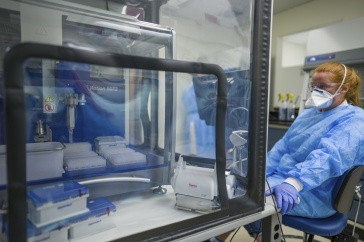UNH’s Innovative, State-of-the-Art Lab Surpasses One Million COVID-19 Tests

TECHNICIANS AT UNH’S STATE-OF-THE-ART TESTING LAB PROCESS SWAB SAMPLES TO MONITOR FOR COVID-19. PHOTO CREDIT: JEREMY GASOWSKI/UNH.
DURHAM, N.H.—A uniquely designed lab on the campus of the University of New Hampshire has completed over one million tests to detect and monitor the coronavirus. The cutting-edge lab not only performs specifically designed self-swab tests for students, faculty and staff but also plays an important testing role to help provide a safe environment for the greater community by processing tests for more than 125 other groups, including secondary schools, long term-care facilities and other colleges in the state.
“The UNH lab was set up in record time to provide an aggressive way to keep our university community safe and over the past year and a half has grown to be an integral part of the state’s COVID-19 surveillance as well as a national leader in COVID genomics and a model for collegiate testing,” said Marian McCord, senior vice provost for research, economic engagement and outreach. “It’s a testament to the extensive expertise at UNH and the dedication that has played a vital part in helping keep the community safe.”
The inventive laboratory located on the Durham campus runs close to 20,000 tests each week. Set up in the summer of 2020 to exclusively test for COVID-19, it was originally designed to fulfill the university’s commitment to monitor the student population and quickly identify and prevent any spread of the virus. Now screening is done on all UNH campuses—Durham, Concord and Manchester—as well as for the other institutions in the University System of New Hampshire which include Granite State College, Keene State College and Plymouth State University. UNH also works in partnership with the N.H. Department of Health and Human Services to service 45 long-term care facilities, over 60 elementary and high schools, 15 shelters and several correctional facilities. The on-site testing at grade schools is done through the Safer at School Screening program which serves both public and private schools and does asymptomatic screening at no cost to the schools.
The lab, which has been certified by the Clinical Laboratory Improvement Amendments, or CLIA, is set up to check for COVID-19. Any tests that come back positive and may require further analysis can be sent to UNH’s Hubbard Center for Genome Studies which can identify variants by sequencing the genome of any positive samples.
“If the state department of public health, or any of our partners, has a sample that comes back positive, UNH’s lab can conduct whole genome sequencing on those positive cases to identify the specific variant,” said Kelley Thomas, professor of molecular, cellular and biomedical sciences and director of the Hubbard Center for Genome Studies. “The overall goal is to identify cases early to allow for proper care and prevent further spread of the virus.”
The UNH testing facility incorporates automation along with a team of skilled lab technicians that work two shifts six days a week. The testing procedure uses what is known as pooled testing where individual samples are combined and tested together to allow for faster results. It is made up of three steps starting with the lab team that receives the test tubes containing samples and scans the assigned barcodes and loads them into the automation. Then a liquid sample is extracted from each swab tube to detect the presence of the virus’s RNA. If RNA is present, it is isolated and then a specially designed machine, called RT-PCR, performs a multi-plex test where it probes three different areas of the virus’s genetic makeup to look for SARS-CoV-2, the virus that causes COVID-19. If a test is positive, UNH scientists can genetically sequence samples in the Hubbard Center for Genome Studies.
The University of New Hampshire inspires innovation and transforms lives in our state, nation and world. More than 16,000 students from all 50 states and 71 countries engage with an award-winning faculty in top-ranked programs in business, engineering, law, health and human services, liberal arts and the sciences across more than 200 programs of study. A Carnegie Classification R1 institution, UNH partners with NASA, NOAA, NSF and NIH, and received $260 million in competitive external funding in FY21 to further explore and define the frontiers of land, sea and space.
VIDEO AND PHOTOS FOR DOWNLOADM
Video and photo link: https://unh.box.com/s/yt3eg9aljjpnfh232ykwempeevrjv79h
Video credit: Courtesy University of New Hampshire
Photo credit: Jeremy Gasowski/UNH
Latest News
-
January 12, 2026
-
December 4, 2025
-
November 26, 2025
-
November 6, 2025
-
November 5, 2025













































